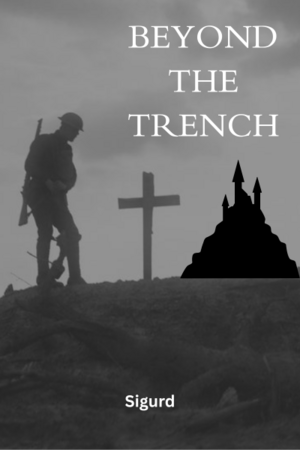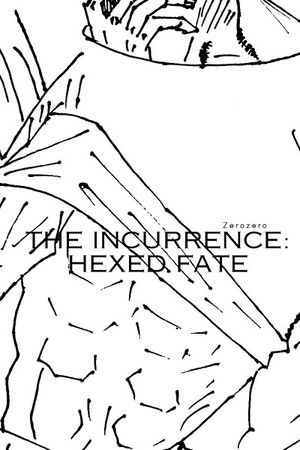Chapter 2:
Camp
Beyond the Trench
“Falkenhayn-Lettow Model 1887, chambered in 8-mil Faulken.” Dave glanced at his orderly’s rifle.
“Rhodes Company Pattern 1898 SMRC MK II, chambered in .303 Sowson.”
Watermann bit his lip in concern, but kept his silence. If he could, he would have blocked his ears from the stuff. Why remind everyone? Then again, his lieutenant was always a stickler for this sort of thing.
“What I would give for some grog...” Dave mumbled.
Recounts of their equipment didn’t make the arduous journey any less monotonous, however. Even now, they felt tempted to take a potshot at some lonesome rock near the horizon. Anything to ease the stillness. No matter what they desired, however, the goal of survival dominated all instincts.
The two men had found neither line nor track. Not even an old, beaten dirt path to guide them. Simple and endless flatness. After the first few hours of hiking and paced swigs of their canteens, they agreed to ration themselves to the very last drop, no matter how much their bellies ached and cried out. Who knew how long they would get to civilization——whatever qualified as civilization in these parts. Dave formulated his first theory in the first few minutes of walking north: they were in the northern heartland of Casingia, their eternal enemy. However, none of the terrain corroborated his musings. It was mere plains and flowers without end. The occasional beech did interrupt, but neither grove nor copse ever made itself known. Skies stretched and seemed endless. The lieutenant gazed absently at the dividing line. Smooth as the reflection of a mirror. But her nitrogen hue became smoky and hazy on the horizon, like freshly burned tobacco vapors.
He looked for it, but nothing was there. The Sequana, that wide watery span that separated home from hell, was nowhere. They couldn’t have been more than a few miles from the line. How was anything else possible? Still, they kept north. No matter how long it took, they would hit their native Lamia. Eventually. The lieutenant deluded himself.
“Lieutenant?” Watermann spoke.
The man’s delusions solidified, then buried themselves. Dave crooked his head slightly, and giving a partial glance to the almost child-like private, he responded: “Yes?”
“You’re not… you’re not mad about before?”
Dave’s thoughts came to a slight stutter, which manifested as a misstep in his walking.
“No. Not this time. Just… don’t do it again. I need you to be as alert as possible.”
Watermann fell silent.
“Yes, sir,” came out only as a small whisper.
Their packs clattered and chimed with the slight movements of their canteens against their packs. Being the taller man, Dave kept his eyes fixed on the horizon for any sign of change. Nothing ever did. Sometimes, they saw birds flying in formation above them, but never toward them. Always away. Keeping with the huntsman tradition, he kept a mental note of certain landmarks and gathered trees to make landmarks of. The lieutenant tried to remember all the game and edible ferns, but his mind failed him. Damn! Father was right—this was useful information. No use for broken memories now. He had to prepare for the night.
The two men found a bare enough patch of earth and cleared it for a fire. Watermann gathered stones from nearby, while Dave constructed a little tinder house for his hungry match to consume. The day burned and died in its own time. The lieutenant felt the sun beat him longer than usual. He didn’t know. One byproduct of the trenches is that officers had to keep accurate and tight schedules. It was easy to lose track of time when the forecast called for steel storms for weeks. Getting over himself, he struck the matchstick, looted off a generous donor and struck it against the rocks; a lone stick becoming an inferno. Their half-tents came up in record time—something the lieutenant and private wished they could show their nosy commanders.
The two looked over their equipment. Between them, they had their general equipment, rifles, rank insignia, entrenching tools, spades, and winter clothes. Dave found his pipe again—a godsend, considering he’d misplaced the damn thing ages ago. Now he just needed some tobacco. The lieutenant kept a journal with him, and the private held his personal vest-pocket camera tight.
He peeked into his rifle chamber again. The brass gleamed. Dave pushed the bolt forward. Vigilance always. A distracted soldier is a dead soldier.
It was dark. A starless night. Dave stared at the raging light between his feet and struggled to sleep. His greatcoat made for a good blanket, but the calf-skin combat pack grated against his scalp. It was certainly a far cry from his white, pristine feather pillow back home, or the Casingian’s pillow he graciously robbed in one particularly shelled ville. Hell, he’d take the hay canvas pillow the other soldiers fashioned out of a sandbag and horse feed. Something that reminded him of home. Something that didn’t smell like blood.
Dave rolled over and tried to re-adjust his neck. His musings had caused his world to go dark. It was the taste in his mouth. That same taste of death. Had the war sullied their hearts to make even the idyllic fields of Elysium feel like they were walking through no-man’s-land? The lieutenant remembered striding through the streets of his hometown after the first battles and after the near-death in the fort. He had barely slipped by Death, only to face him again while fighting to stabilize the front. Once the lines were static and his leave earned, he went by train to his town. He departed the station, feeling overwhelmed by the humanity and phantoms of war around him. But in that station, surrounded by the future dead, he felt only the pulsing life of the city. Here, it was like walking through a graveyard.
A small rustling startled him. Dave stared deeply into the canvas ceiling of his half-tent. He hoped like a child that if he didn’t move, the noise wouldn’t get him. He heard the sound round the tent, sitting in front of the fire and partially blocking it. The lieutenant dared to look. It was his batman. Watermann kneeled in front of the fire, muttering to himself before crawling back into his own half-home. Dave could recognize a prayer stance from anywhere. The young private had prayed for the both of them. He felt it in his heart.
What cowardice he’d shown! He froze because of a mere noise? What an embarrassment. Where had the mustered courage and mechanical ferocity of his trench days gone? It hadn’t even been a day, and here he was jumping at bumps in the night. Just two days ago, he was garroting “bumps in the night” as they attempted to cut the wire, and a week before, he’d thrown his bombs at them. What was he doing?
Dave sighed to himself. It was always the same. Always. The doubt bubbled up from his chest and consumed him. It was with him since boyhood, and he never banished that devil, no matter how much he tried. On the battlefield, he had suppressed his doubt in the clockwork that was a nation at war. Papers, documents, orders, whistles, brandy, rum; all managed him through it. Absent those, he returned to a cowardly form.
But do not all men have a coward’s streak in them? Has no man felt the anticipation of a howling wolf raise his skin and cause him to sweat in fear? Should a man decry his ancestors and label them cowards for perspiring before stabbing the beast’s heart? Dave thought not. What mattered most was action. Action, not emotion, kept men alive. It is the fulfillment and manifestation of thought. The will cannot do without acting, and as long as he made the correct decisions—those that kept men alive—no harm was done. Catching himself in emotion, a man would surely feel only regret later. Regret. Something only fools and cowards feel. No real coward was worthy of the title “officer.”
The brave and the foolish made for prime cuts on Death’s table, however. Such was the fate of all good men. It had been almost a year since the start of the war, and he was still alive. Then…
Dave yawned. He would resolve the matter in the morning.




Please sign in to leave a comment.